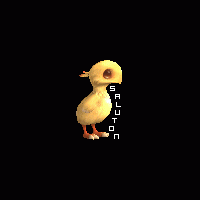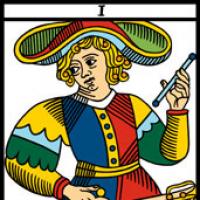Mesaĝoj: 42
Lingvo: English
Pastoro (Montri la profilon) 2009-junio-30 13:18:39
In Japanese the months have numeric names too: ichigatsu, nigatsu, sangatsu...
ceigered (Montri la profilon) 2009-junio-30 18:03:34
Oŝo-Jabe:It'd make more sense as an international language to have a systematic system that any 6 year old mongolian nomad can pick up easilyPolaris:Personally, I greatly prefer the unique names for the months and days. It gives flavor to the language, and it ties it to a great deal of world languages already in existence, as one can compare and contrast how closely the Esperanto name resembles the name of the day or month in a language he already speaks.As Esperanto is meant to be an international language, it actually does make less sense to have unique month names.
 .
.The easiest days and months in any language to pick up are those with numbers. However we then run into the problem as far as days are concerned as it's hard to tell which day is the first one (at least from an English perspective)
I say monday would be unuatag' (to differentiate between 'one day' and 'day-one', 'a' is added regardless of the coupling between the words)

Therefore:
Sesatage mi rigardos 'Suzumiya Haruhi no Yuutsu episodo 14: Senfina Ok III'-n'
(Saturday I will watch 'The Melancholy of Haruhi Suzumiya Episode 14: Endless 8'
===
For clarification: My sample sentence at the end was structured horribly, it probably should have been "Sesatage, mi rigardos la dekkvaran episodon "Senfinan Ok" de la animeo "Suzumiya Haruhi no Yuutsu". Just so learners don't abuse the accusative case like myself
Maverynthia (Montri la profilon) 2009-julio-09 18:59:56
I also study Japanese and they do it this was as well. Really easy to remember.
The way the Japanese do days of the week is based on Elements, Moon starts the week (Monday) and Sun ends the week.. So:
Moon (Moon) Monday, Fire (Mars) Tuesday, Water (Mercury) Wednesday, Wood (Jupiter) Thursday, Gold (Venus) Friday, and Sun (Sun) Sunday
I'm not saying this is any easier, but it's more cohesive than just random letters as the days of the week Also, Gold on Friday is significant as that is usually payday.
ceigered (Montri la profilon) 2009-julio-10 09:21:04
Maverynthia:I agree with numbering the months as 1-2-3.I think you missed saturday (or I can't read, either one is likely)
I also study Japanese and they do it this was as well. Really easy to remember.
The way the Japanese do days of the week is based on Elements, Moon starts the week (Monday) and Sun ends the week.. So:
Moon (Moon) Monday, Fire (Mars) Tuesday, Water (Mercury) Wednesday, Wood (Jupiter) Thursday, Gold (Venus) Friday, and Sun (Sun) Sunday
I'm not saying this is any easier, but it's more cohesive than just random letters as the days of the week Also, Gold on Friday is significant as that is usually payday.

Nonetheless interesting how monday is identically derived.
haYnguy (Montri la profilon) 2009-julio-10 12:36:04
Febrero (Spanish), Februaro (Esperanto)
April (English) , Aprilo (Esperanto)
Oktober (German), Oktobro... you get the idea.
I believe Zamenhof chose these names since more people knew english, the romantic languages, and germanic languages which all had similar names for months and the same order than any asian language.
Just a guess

Ironchef (Montri la profilon) 2009-julio-10 16:15:41
haYnguy:I believe Zamenhof chose these names since more people knew english, the romantic languages, and germanic languages which all had similar names for months and the same order than any asian language.I believe you have to look at the historical context of where Zamenhof lived in the 1880s. Europe was a shifting battleground and borders and nationalities were changing literally overnight. I think you have to understand who Zamenhof was aiming his language at in 1887 as much as anything. Yes, it was the International Language but in 1887 "International" meant a very different thing that it does today. English, French, Polish, Russian, German and Swedish, were undoubtedly the main players back then. I doubt he was expecting comment from the Chinese, Japanese (or even the Americas) at that point. If he could unify the Russians, Jews, Poles and French, who were the polyglots of Bialystok, he would have felt he'd done enough probably.
yugary (Montri la profilon) 2009-julio-14 08:02:13
Senlando:So i guess we have to pick between Chinese, Korean, and perhaps other cultures who call monday the first day. And Jews, Christians, (maybe Muslims?) and other cultures who consider Sunday to be the first day.The Koreans and Japanese do not use numbers for the names of the days of the week. They name them Sun Day, Moon Day, Fire Day, Water Day, Wood Day, Metal Day, and Earth Day. The names of Tuesday through Saturday correspond to the Five Modes of Action (sometimes mistakenly called the Five Elements) in East Asian philosophy as well as to the names of the five planets visible to the naked eye. They therefore correspond exactly to the Western names of the weekdays, because Mars is the Fire Planet, Mercury is the Water Planet, Jupiter is the Wood Planet, Venus is the Metal Planet, and Saturn is the Earth Planet (here "earth" means 'soil'). Korean and Japanese calendars show Sunday as the first day of the week and so do the Chinese calendars I've seen. I think they think of Xingqiri (Sunday) as the day that marks the beginning of a new cycle and therefore don't give it a number, using "one" for Monday.
Even some of the months of the traditional lunar calendar in Korea have names rather than numbers (namely, the first, eleventh, and twelfth months).
I personally am glad that the months and weekdays have names in Esperanto. With a complete date and time, it helps break up the long strings of numbers you'd get if everything were done with numbers. How would you like to say "Year 2009, month 7, day 13, hour 16, minute 58"? And after all, how hard is it to learn 12 month names and 7 weekday names? I think the names give them more character.
Francisko1 (Montri la profilon) 2009-julio-29 16:24:00
mardo = marstago
merkredo = merkurtago
jxauxdo = jupitertago
vendredo = venustago
sabato = saturnotago
dimancxo = suntago
Senlando:btw, through the word building method of Esperanto, it should be completely acceptable to use unuamonato, duamonato, triamonato,... am i right? if enough people use a word, it might become accepted as common vocabulary, and perhaps the European names of the months would slowly disappear.
days would be harder, since one would have to differentiate between days of the month, and days of the week. anyone have a suggestion for days of the week?
Vilinilo (Montri la profilon) 2009-julio-29 17:47:49
Domingo = Sunday
Segunda-feira = Second feria
Terça-feira = Third feria
Quarta-feira = Fourth feria
Quinta-feira = Fifth feria
Sexta-feira = Sixth feria
Sábado = Saturday
Curiously, although in Portuguese Monday is called "Segunda-feira" (Second feria), most people consider it the beginning of the week.

mnlg (Montri la profilon) 2009-julio-29 18:10:03
Vilinilo:Curiously, although in Portuguese Monday is called "Segunda-feira" (Second feria), most people consider it the beginning of the week.This is dictated by the ISO, and it has always made sense to me, because I do not work on Sundays, and I do not work on weekends, therefore Sunday must be a part of the weekend, and therefore Sunday must appear at the end of the week. QED.








